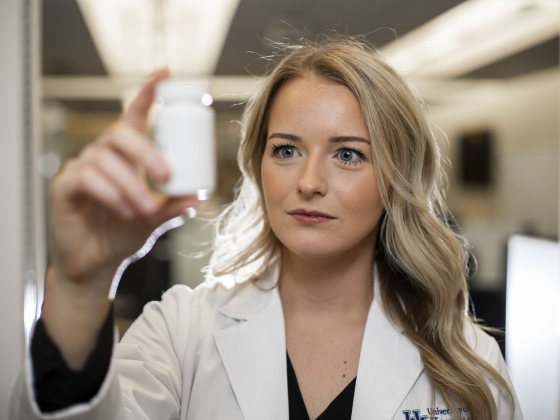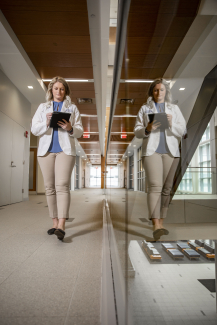The Office of External Studies coordinates the pharmacy practice experiential components of the curriculum which includes Introductory and Advanced experiences. These experiential components are designed to provide students opportunities for hands-on experience in a variety of pharmacy practice settings beginning early in their professional training and continuing through their final year of the Doctor of Pharmacy program. The goal of experiential education is to assist students in developing the knowledge, skills and attitudes required of a competent and caring pharmacy professional.

PharmD Progam Experiential Education
Office of External Studies
Meet the team of people who runs the experiential portion of our Doctor of Pharmacy degree while supporting our students and preceptors.
Become a Preceptor
Preceptors help guide and mentor the next generation of pharmacy leaders. We are proud to partner with over 600 preceptors who support the experiential education program and contribute to the education of our students.
Experiential Program Courses
We offer a four-year professional program leading to a Doctor of Pharmacy (PharmD) degree. Students spend three years on the University of Kentucky campus, completing introductory pharmacy practice experiences at the end of their first and second professional year. For their entire fourth professional year, students are assigned advanced pharmacy practice experiences gaining supervised, on-the-job experience.
IPPE: Introductory Pharmacy Practice Experience
The UK College of Pharmacy assigns all Professional Year (PY) 1 students to introductory pharmacy practice experiences (IPPE) during the summer following student's first year.
(PHR 928) IPPE-Community: 3 weeks (120 hours) of introductory to pharmacy practice in a community setting across the Commonwealth.
(PHR 929) IPPE-Institutional: 3 weeks (120 hours) of introductory to pharmacy practice in an institutional setting across the Commonwealth.
IPPE- Longitudinal
Still an introductory experience, IPPE-Longitudinal (formerly LEEP) offers four direct patient care experiences to students during the academic semesters in their PY2 and PY3 years. The experiences allow students to participate in counseling patients, collecting, assessing, and documenting information, and medication therapy management processes in an authentic direct patient care environment. Earlier exposure to direct patient care enables students to develop their professional communication skills, explore potential career interests, and begin establishing their professional network much earlier in their pharmacy education. This supports students’ ability to tailor their elective courses, extracurricular activities, and APPE experiences to meet their interests and career goals.
(PHR 930, 940, 950, and 960) IPPE Longitudinal is part of the Patient-centered Care Experience (PaCE) laboratory course sequence: which includes 60-80 hours in various direct patient care settings.
APPE: Advanced Pharmacy Practice Experience
The UK College of Pharmacy assigns all PharmD candidates PY3 students at the end of their third professional year to APPE rotations located throughout the Commonwealth of Kentucky. A limited number of rotation sites are available at out-of-state and international locations. Students complete rotations in a variety of settings, including community hospitals, community pharmacies, acute care inpatient, and ambulatory clinics.
APPE rotations are experience-based integrated problem-solving courses designed to help the student become an active participant in providing contemporary patient care services. The student under the direction of different faculty will integrate their knowledge of pharmacotherapy, disease states, dosage formulations, and pharmacokinetics in developing and assessing therapeutic plans and in evaluating drug selection for patients. The student will learn about drug delivery systems, dispensing issues, and management strategies in the various sites.
Each rotation will stress outcome-oriented decision making in clinical situations regarding drug therapy in specific disciplines. Students will attend physician rounds/ interdisciplinary team meetings, attend conferences and discussions, monitor and present assigned patients, and interact with patients and health care professionals. Over the course of their experience, students will learn to develop recommendations and participate in decisions about drug therapy considering factors involving efficacy, toxicity, cost, third party coverage, and unique methods of delivery.
APPE students complete seven, 6-week rotations: four required rotations and three electives. Required rotations include Advanced Community Practice (ACP); Advanced Hospital Practice (AHP); Ambulatory Care Practice (AMP); and Acute Care Inpatient (ACI). Elective rotations may include the required rotation types, plus other rotations in a variety of practice settings: pediatrics, managed care, research, nutrition, hospital management, pharmacy education, pharmacoeconomics, and emergency medicine, to mention just a few.
Also, note that the UK College of Pharmacy has a Louisville based Clinical Education Center that serves as the home base for some students on APPE rotations during their 4th year.
As part of the APPE curriculum, each student pharmacist completes a Commonwealth Experience Rotation in a designated site outside the Lexington area. This immersive rotation allows students to engage directly with communities across Kentucky, often in rural or underserved settings, where pharmacists play a vital role in improving public health and access to care. Through this experience, students enhance their cultural competence, explore health disparities, and apply their clinical knowledge to real-world patient care. By connecting classroom learning to community impact, the Commonwealth Experience fosters both professional growth and a deeper understanding of how pharmacists advance the health of the Commonwealth.
Louisville Based Clinical Education Center
The Louisville-based Clinical Education Center (LCEC) is a partnership between the University of Kentucky College of Pharmacy and Norton Healthcare. The Louisville CEC was established in 2006 by the College and began enrolling students during the 2007-2008 rotation year. This center serves as the home base or "hub" for students on advanced pharmacy practice experience (APPE) rotations during their 4th year.
Since its inception, the Louisville CEC APPE rotation offerings have increased significantly, providing a wide variety of experiences for students enrolled in this program. This unique program is especially attractive for students who desire to complete all or a majority of their rotations in one geographical area, minimizing the need to move to other locations. Additionally, the Louisville CEC program has attracted students pursuing post-graduate residency programs as many preceptors have been residency trained. The CEC enrolls 20-25 fourth-year students each year.
A UK faculty member is on-site at the CEC to oversee the students' clinical rotations, provide preceptor support, and assist and facilitate the expansion of area rotation sites. The CEC office in Louisville is located in Norton Audubon Hospital and is directed by Clinical Training Coordinator (CTC) and Assistant Professor Dr. Janet Mills.
The CEC holds regularly scheduled educational meetings where students, preceptors, and pharmacists deliver presentations, share experiences, and network. The primary educational presentations consist of patient case/disease reviews, journal clubs, resident-facilitated interactive patient case sessions, and specialty seminar topics.

